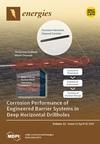利用多代理强化学习评估自组织虚拟发电厂的低碳灵活性
IF 3
4区 工程技术
Q3 ENERGY & FUELS
引用次数: 0
摘要
虚拟发电厂(VPP)通过物联网技术汇聚大量分布式能源资源(DER),为电网提供灵活性。它是促进可再生能源利用、实现未来电力系统碳中和的有效手段。本文针对 DERs 的低碳效益评估问题,提出了自组织 VPP 的灵活性评估模型,以量化 DERs 在不同时段响应行为的低碳价值。首先,介绍了基于可再生能源与负荷需求曲线同步率的零碳指数定义。然后,我们建立了虚拟电厂的多级自组织聚合方法,定义了 DER 的基本规则,并将其自组织聚合表征为马尔可夫博弈过程。此外,我们还利用 QMIX 实现了虚拟电厂自下而上、由简到繁的分层构建。实验结果表明,当用户追踪零碳曲线时,可以在不降低总体负荷的情况下实现零碳排放,从而显著增强电网的调节能力和可再生能源的消耗。此外,自组织算法还能优化 DER 的组合,提高 VPP 在复杂环境中的协调效率。本文章由计算机程序翻译,如有差异,请以英文原文为准。
Assessment of Low-Carbon Flexibility in Self-Organized Virtual Power Plants Using Multi-Agent Reinforcement Learning
Virtual power plants (VPPs) aggregate a large number of distributed energy resources (DERs) through IoT technology to provide flexibility to the grid. It is an effective means to promote the utilization of renewable energy, and enable carbon neutrality for future power systems. This paper addresses the evaluation issue of DERs‘ low-carbon benefits, proposes a flexibility assessment model for self-organized VPP to quantify the low-carbon value of DERs’ response behavior in different time periods. Firstly, we introduce the definition of zero-carbon index based on the curve simultaneous rate of renewable energy and load demand. Then, we establish a multi-level self-organized aggregation method for virtual power plants, define the basic rules of DER, and characterize its self-organized aggregation as a Markov game process. Moreover, we use QMIX to achieve a bottom-up, hierarchical construction of VPP from simple to complex. Experimental results show that when users track the zero-carbon curve, they can achieve zero carbon emissions without reducing the overall load, significantly enhancing the grid’s regulation capabilities and the consumption of renewable energy. Additionally, self-organized algorithms can optimize the combinations of DERs to improve the coordination efficiency of VPPs in complex environments.
求助全文
通过发布文献求助,成功后即可免费获取论文全文。
去求助
来源期刊

Energies
ENERGY & FUELS-
CiteScore
6.20
自引率
21.90%
发文量
8045
审稿时长
1.9 months
期刊介绍:
Energies (ISSN 1996-1073) is an open access journal of related scientific research, technology development and policy and management studies. It publishes reviews, regular research papers, and communications. Our aim is to encourage scientists to publish their experimental and theoretical results in as much detail as possible. There is no restriction on the length of the papers. The full experimental details must be provided so that the results can be reproduced.
 求助内容:
求助内容: 应助结果提醒方式:
应助结果提醒方式:


